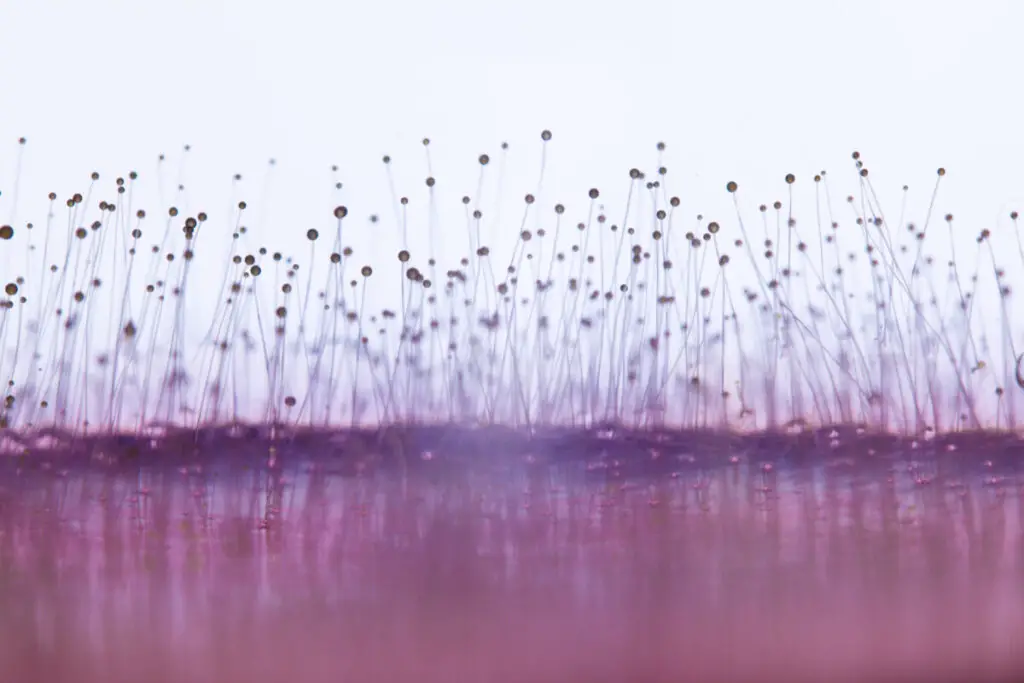A house usually smells like ammonia because of mold, leaking refrigerant or pet urine. However, household cleaners, fertilizers in pot plants or a gas leak can also cause an ammonia like odor to spread throughout your home. If the smell is only in your bathroom (or other wet areas) it’s most likely Serratia marcescens, a pink bacteria that grows in damp places.
Our homes can have all sorts of unpleasant smells. Sometimes these nasty odors are just in one room, but they can also spread through your house like a nightmare. A few ammonia smells can also mean there are hidden dangers in your home, so it’s important that you figure out the source of the smell and get rid of it fast.
This article has all the reasons why you have an ammonia smell in your home, including the top three reasons and another 5 reasons that are rarer, but still possible. Each problem has detailed information so you can figure out what your problem is and fix it.
How ammonia can affect us
Ammonia is a colorless gas often used in farming and manufacturing products, such as plastics.
It’s also a powerful cleaning agent.
Ammonia is even found in soil from natural bacterial processes. Where it’s produced when dead plants and animals feces decay.
When ammonia is around in even moderate levels it has a strong and distinct smell.
Any suspicious ammonia odor in your home should be investigated immediately.
Is Ammonia harmful to humans?
Exposure to high concentrations of ammonia in the air causes immediate burning of the eyes, nose, throat and respiratory tract. Prolonged exposure can result in blindness, lung damage or death.
Inhalation of lower concentrations can cause coughing and irritation of the nose and throat.
If you’re worried about regular exposure to ammonia in your home or workplace, Plentiful Air has a complete guide to air purifiers that can remove ammonia available here.
8 reasons why your house smells like ammonia
A house can smell like ammonia from a number of sources, including:
- Mold (or bacteria)
- Leaking refrigerant
- Pet urine
- Fertilizers
Some causes like leaking ammonia cleaner in a confined space, can be dangerous, while other causes, like cat urine are annoying rather than dangerous.
But there are lots of other reasons why your house may smell like ammonia:
1. Mold

An ammonia-like smell can be caused by certain types of mold, and even some kinds of bacteria.
Serratia marcescens is a bacteria often mistakenly called a pink mold because it looks like mold and is usually found in areas where you expect mold to grow, like bathrooms.
It loves to grow on surfaces that are regularly damp or wet, like shower curtains, sinks and toilets, and can have a strong urine-like smell.
An ammonia-like odor after a period of rain can also be caused by mold. Water encourages mold growth, and smells from mold are more noticeable when the area is wet.
Walls with water stains can often have mold growth, because mold spores need moisture to germinate. Mold looks similar to paint splotches in green, black or gray scattered across the surface it’s growing on.
Most mold on interior walls is caused by leaks in the roof.
If you find mold growing anywhere you should remove it as soon as possible.
Note: FEMA recommends that mold growth larger than 25 square feet should be removed by a mold remediation specialist.
Diagnosis
- Check your home (roof, walls, floors and ceilings) for mold
- Look in any regularly wet areas (bathroom, laundry, basement) for pink bacteria growths
- Mold can be hidden beneath wallpaper and paint, so it can be difficult to find.
- If mold growth is present, any drywall can also be damaged because mold eats materials like wood and drywall as time goes on.
Solutions
- If the area of mold growth is fairly small, you can scrub it away with liquid dish detergent and water.
- If the area is heavily stained you can use chlorine bleach or vinegar and water to remove the mold.
- Vinegar is a better option than bleach because it also kills mold spores.
- Dry the area thoroughly after removing the mold.
- Find the source of moisture and repair it to keep the mold from returning.
- You can also install a ventilation fans in your bathroom or kitchen as a more permanent solution to help prevent mold.
- Using a dehumidifier during the hot, humid months of summer can also keep humidity levels at a normal range and discourage mold.
2. Leaking Refrigerant
Old household refrigerators use ammonia as a coolant rather than Freon (which impacted the ozone layer), or HFC-134a (1,1,1,2-tetrafluoroethane), which doesn’t affect the ozone layer.
If your home has an older model refrigerator, leaking refrigerant ammonia is a possible source of the smell.
Refrigerant is also used in air conditioners, but the smell from Freon or newer refrigerants is usually sweeter and doesn’t smell like urine. Although a few people identify its odor as a combination of paint and cat urine.
So, yes, freon or any other refrigerant may smell like pee.
Diagnosis
- Look for yellow stains in and around your fridge and air conditioner unit.
- You can buy an ammonia detector to figure out how much ammonia is present in your refrigerator, and if the coolant numbers are down you have a leak.
Solutions
- Replace the entire cooling component within your refrigerator or the refrigerator itself.
- Leave coffee grounds, baking soda, or newspaper in the fridge to absorb the smell.
- If your air conditioner is to blame then you could have the leak sealed.
3. Pests and Pets

Rodents, pests and animals crawl into your AC vents during winter. Over time, they can die, and their decomposing bodies (I know, it’s not a lovely thought) can give off a urine smell.
Especially when you first turn on your AC after a few months.
Meanwhile, if you have a pet, especially cats, dogs or rats, then your home is almost guaranteed to smell like urine at some point.
Cat urine contains high levels of urea, which is an ammonia compound that will make a strong smell where your cat has urinated. In fact, cat urine has higher levels of urea than dog urine, so it smells far more strongly than dog urine.
Remember to frequently change your cat’s litter to minimize the overall emission of ammonia into the air. Especially in the warmer months.
If your cat or dog has an incontinence problem or behavioral problem it may urinate in other areas of your home besides the litter tray or garden, especially if your cat has an undiagnosed urinary tract infection (UTI).
Diagnosis
- Check your cats litter box.
- Check for stains around your home where pet cat may have urinated.
- Use a UV light to identify areas where your cat is urinating.
- Check with a vet that your cat does not have a UTI.
- Look in your vents and AC or HVAC unit for pests or feces.
Solutions
- Clean up accidents quickly.
- Clean out the litter tray frequently.
- Always have plenty of drinking water available for your cat.
- Consult an animal behaviorist, if your cat is urinating around your home.
- Consult your vet, to determine if your cat is incontinent or has a UTI.
- Clean your AC or HVAC at the end of each winter
4. Gas leak
If there are leaks in your plumbing system from damaged or improperly placed pipes or vents, you can become exposed to sewer gas. It often has a urine or ammonia-like smell.
Sewer gas is a complex mixture of gases and compounds, some of which are toxic to us. While sewer gas isn’t dangerous in small amounts, it can be at high levels.
It can leak into your home in many ways such as plumbing vents installed too close to a window or air intake, leaks from nearby septic systems and degraded, cracked, or broken, pipes.
Diagnosis
- Try to locate where the leak is coming from.
- Check all floor drains, toilets, and vents to make sure nothing is cracked, blocked, clogged, or loose.
Solutions
- Call a plumber to come and inspect you home as soon as possible to fix the leak.
5. Fertilizers

Without realising it, we can be exposed to the ammonia in fertilizer (and potting mix) when they’re not stored properly or they are leaking.
Handling fertilizers requires special care and attention, they need be stored properly.
If possible store it outside your home, in a shed or undercover area, away from places that are regularly used or where someone might accidently cause it to leak.
Diagnosis
- Look for bright-colored granule material on the floor or shelving, liquid fertilizers can discolor the spilled area.
Solutions
- Store fertilizer for only a few days.
- Place bagged fertilizer in a location high enough that flooding will not damage the bag.
- Place mats down near the fertilizer to soften the blow if any of the bag fall onto the floor.
- Wash the area with a hose, and leave the doors open until the ground is dry.
6. Cleaning products
Ammonia is a common ingredient in household chemical cleaners and may be the cause of a urine smell in your home.
It’s important to make sure your cleaning products are safe and non-hazardous to both you and the environment.
While ammonia is found in some cleaning products, it isn’t in all of them. So if you recently changed the brand of surface or window cleaner you are using that might explain a sudden urine like smell.
Diagnosis
- Check for leaking bottles or containers of your cleaning products.
- Lift up the bottles to check for signs of leaking, such as a wet or dried moisture ring.
- Shake the bottles gently and watch for leaking cleaner.
- Test all caps and seals by tightening them and turning the bottles upside down to see if any leak.
- Check the active ingredient on the cleaning products in your home
Solutions
- Remove any products that are leaking.
- Store products containing ammonia outside of the home.
- Store products containing ammonia in a well ventilated area.
- Research the ingredients that are used in your cleaning products.
7. Rodents
If you don’t have a cat, urination from other animals could potentially cause an ammonia smell. So you might need to check for pests like mice or larger rodents.
Diagnosis
- Listen for squeaking or scurrying sounds in the walls.
- Listen for running or soft footstep sounds primarily at night.
- Look for piles of droppings in an area behind a stove, in the basement or attic, or on the ground.
- Check food packages, containers or wooden spoons for signs of damage and gnaw marks.
- Look for rub marks on walls. Rats have terrible eyesight, so they the same routes along skirting boards and walls.
- Check your garden or outside your home for rat holes.
Solution
- Keep food in sealed containers
- Clean up any spills or crumbs.
- Since rats need a reliable water source, make sure you have no leaks in your pipes or faucets.
- Keep your garbage-can lids on tight.
- Store grass seed and birdseed in sealed containers.
- Put away cat and dog food when they’re finished.
- Call an expert pest management company.
8. Light Fittings

When light bulbs are burnt out, or getting close to it, they can emit a strong chemical smell. Faulty bulbs that are burning inside or getting overheated, may smell like ammonia or a dead animal.
The most common complaint of bulbs smelling like ammonia is seen to be from CFL, or compact fluorescent lights, also commonly referred to as energy-saving bulbs. CFLs (compact fluorescent lamp) light bulbs are the most common type of energy-saving bulb.
Diagnosis
- Check all of your light fixtures, lamps and ceiling, unscrew every bulb and smell it.
Solutions
- Replace the bulb.
- Ventilate the house.
Frequently Asked Questions
Can a dead animal smell like ammonia?
If you have a powerfully strong, ammonia smell in your home and you can’t identify the source, you might have a dead animal in your walls.
The smell of a dead mouse, in particular has a very strong smell, but has qualities similar to other odors that you may be more familiar with:
- When a mouse first dies, it gives off a smell of sulfur, which is similar to rotten eggs.
- As the mouse’s body continues to decompose, you may smell methane, which is similar to the odor of paint thinners.
- A dead mouse also gives off a smell of ammonia, similar to urine or cleaning agents.
- As the decomposition speeds up, you may detect an odor similar to soil or rotten food.
Can insulation smell like ammonia?
Ammonium sulfate and boric acid are fire retardants commonly found in cellulose insulation.
Occasionally, the ammonium sulfate can off-gas and produce an odor. Humidity or moisture are suspected as the reason for the off gassing. In damp environments, it can also form corrosive by products that can degrade metal that it comes in contact with.
Plentiful Air has more detailed information on why your air conditioner smells like urine available here.
